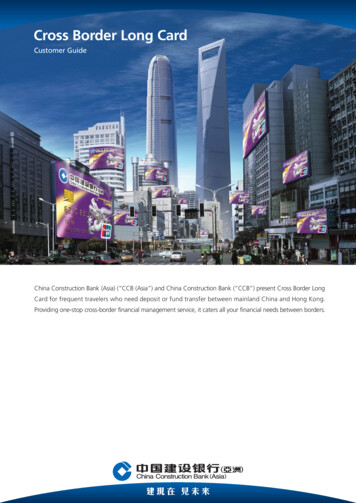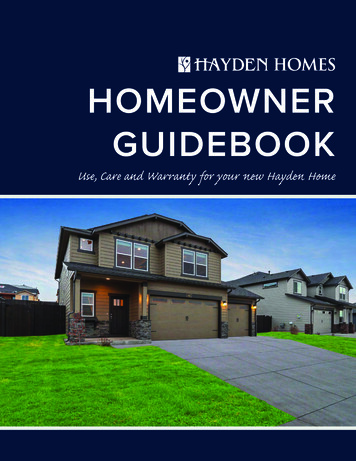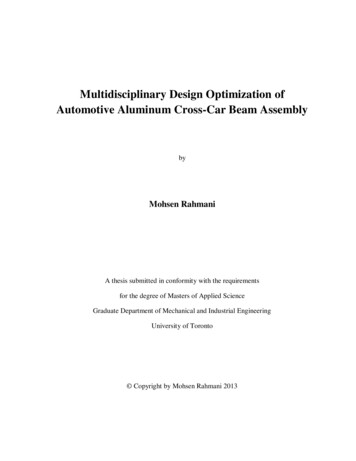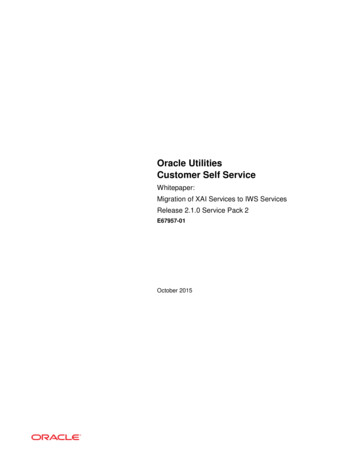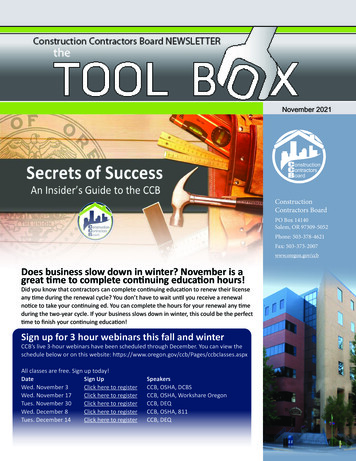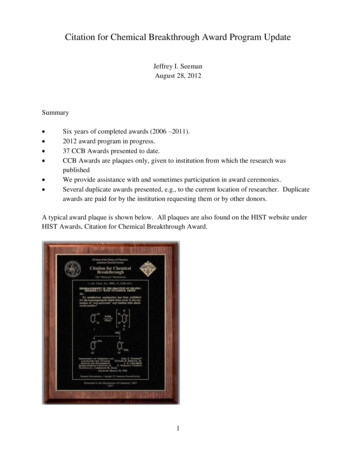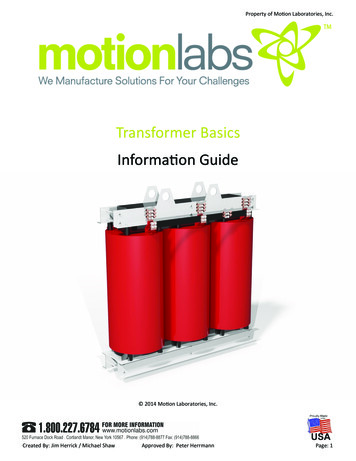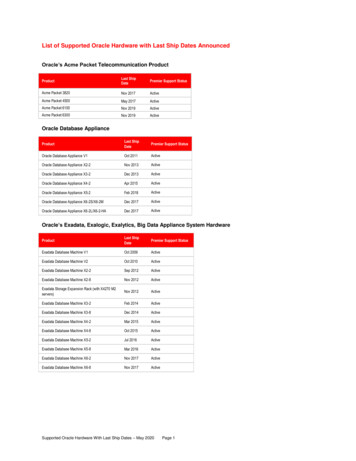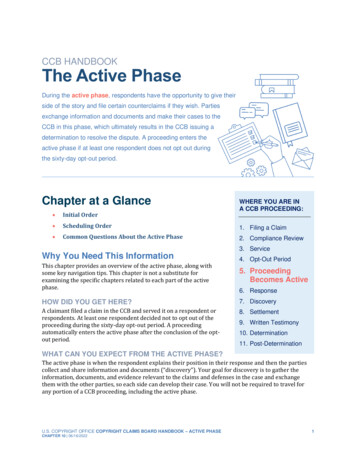
Transcription
CCB HANDBOOKThe Active PhaseDuring the active phase, respondents have the opportunity to give theirside of the story and file certain counterclaims if they wish. Partiesexchange information and documents and make their cases to theCCB in this phase, which ultimately results in the CCB issuing adetermination to resolve the dispute. A proceeding enters theactive phase if at least one respondent does not opt out duringthe sixty-day opt-out period.Chapter at a GlanceWHERE YOU ARE INA CCB PROCEEDING: Initial Order Scheduling Order1. Filing a Claim Common Questions About the Active Phase2. Compliance Review3. ServiceWhy You Need This InformationThis chapter provides an overview of the active phase, along withsome key navigation tips. This chapter is not a substitute forexamining the specific chapters related to each part of the activephase.4. Opt-Out Period5. ProceedingBecomes Active6. ResponseHOW DID YOU GET HERE?7. DiscoveryA claimant filed a claim in the CCB and served it on a respondent orrespondents. At least one respondent decided not to opt out of theproceeding during the sixty-day opt-out period. A proceedingautomatically enters the active phase after the conclusion of the optout period.8. Settlement9. Written Testimony10. Determination11. Post-DeterminationWHAT CAN YOU EXPECT FROM THE ACTIVE PHASE?The active phase is when the respondent explains their position in their response and then the partiescollect and share information and documents (“discovery”). Your goal for discovery is to gather theinformation, documents, and evidence relevant to the claims and defenses in the case and exchangethem with the other parties, so each side can develop their case. You will not be required to travel forany portion of a CCB proceeding, including the active phase.U.S. COPYRIGHT OFFICE COPYRIGHT CLAIMS BOARD HANDBOOK – ACTIVE PHASECHAPTER 10 06/16/20221
WHAT HAPPENS NEXT?The respondent will file a response (and any counterclaims they might have) before the partiesexchange relevant information and documents during discovery. After that, the parties will present theircases to the CCB before it issues a determination resolving the dispute.Initial OrderOnce a proceeding becomes active, the CCB will issue an order directing the claimant to pay the secondfiling fee of 60 and directing any participants who haven’t yet done so to both register for eCCB andlink their eCCB accounts with the case. The participants will have fourteen days from the date of theorder to complete these tasks.Claimant Pays a Second Filing FeeIf you’re the claimant, you paid a 40 filing fee when you submitted your claim. Now you’ll have fourteendays from the date of the initial order to submit the second filing fee payment of 60 through eCCB.Your proceeding will be delayed if you don’t submit the second filing fee within fourteen days. If youdon’t pay within twenty-eight days (after fourteen days, a second fourteen-day order is issued), yourproceeding will be dismissed without prejudice unless the CCB decides there are reasons that wouldmake dismissal unfair. If you are unable to pay the 60 filing fee in time, you should contact the CCB atasktheboard@ccb.gov to discuss your options.Registration for eCCBYou must register for eCCB (if you haven’t already) and link your eCCB account to the case withinfourteen days from the date of the order instructing you to do so. Linking your eCCB account to the caseallows you to make and receive filings in your case. You can find information on how to register for eCCBin the eCCB chapter.Failure to register for eCCB may result in your claim being dismissed due to a failure to proceed if you’rea claimant, or a default determination being entered against you if you’re a respondent.In extremely rare circumstances, the CCB may waive the eCCB registration requirement for selfrepresented parties who are truly unable to use eCCB. If you are representing yourself in the proceedingand you aren’t able to use eCCB because, for example, you don’t have access to the internet, you cancontact the CCB at asktheboard@ccb.gov to discuss your options, including getting a waiver of therequirement. However, the CCB was designed to be a virtual tribunal, with an electronic filing system, toensure it is easy and cost-efficient for the parties. Accordingly, any waivers of the eCCB requirementwill be rare and will require a showing that you truly cannot use eCCB.Scheduling OrderAfter fourteen days have passed since the initial order was issued, and the claimant has paid the secondfiling fee, the CCB will issue a Scheduling Order. The Scheduling Order provides a roadmap for theproceeding and includes key dates and deadlines for each stage of the active phase. The SchedulingOrder will include the following events:U.S. COPYRIGHT OFFICE COPYRIGHT CLAIMS BOARD HANDBOOK – ACTIVE PHASECHAPTER 10 06/16/20222
RESPONSEPRE-DISCOVERYCONFERENCEDISCOVERYThe respondent files their response to the claim against them, along with anycounterclaims they want to make against the claimant. If counterclaims arefiled, they will be checked for compliance with the law and CCB regulations. Ifso, the counterclaim respondent will need to file a response to thecounterclaims.A Copyright Claims Officer holds a virtual conference to discuss theproceeding, how the steps of the proceeding will work, and whether theparties are interested in voluntarily resolving their claims through asettlement conference.The parties exchange standard information and documents that are relevantto the issues in the proceeding (a process called "discovery"). Parties have anopportunity to ask for more discovery, but only if it is narrowly tailored to theissues in the proceeding.POSTDISCOVERYCONFERENCEOnce the discovery period ends, a Copyright Claims Officer holds a virtualconference to discuss the process of presenting your case to the CCB and mayagain discuss whether the parties are interested in voluntarily resolving theirclaims through a settlement conference.MAKINGYOUR CASEThe parties present their cases in the form of a) written position statementsdescribing why they think they should win, b) statements from any witnesses,and c) their documentary evidence.HEARINGAfter reviewing each party's written materials, the CCB can decide the case onthe papers, or the CCB may decide to hold a hearing on the issues if it thinks itwould be helpful. All hearings are virtual.DETERMINATIONThe CCB will issue a determination that resolves the issues in the proceedingand includes the reasons for the decision.It’s important that you attend each conference and meet each deadline in the schedule. If you missdeadlines or don’t show up to conferences or the hearing, then you risk having a default determinationentered against you if you’re a respondent or having your claim dismissed if you’re a claimant.The CCB can change the schedule, if necessary. Reasons why the CCB might change the schedule include: to pause the proceeding (for instance, to review a counterclaim to make sure it’s compliant), to give the parties time to discuss voluntarily resolving their claims through settlement, to accommodate a party’s request, or to manage its own schedule or workload.You can find more information on how to request that the CCB change the schedule below.U.S. COPYRIGHT OFFICE COPYRIGHT CLAIMS BOARD HANDBOOK – ACTIVE PHASECHAPTER 10 06/16/20223
Common Questions for the Active PhaseThis section covers some key issues that might come up during the active phase of your proceeding.Do I need to travel for CCB proceedings?No. All proceedings before the CCB are held virtually, so you can participate in CCB proceedingswherever you are, and you don’t need to travel. Hearings and conferences will typically be held viaZoom. The CCB will provide instructions for accessing a virtual hearing or conference prior to the date.You should test the Zoom platform before the hearing or conference to make sure that you are able tolog in and that your microphone and camera work. If you can’t use or don’t have access to Zoom, contactthe CCB at asktheboard@ccb.gov to discuss alternative arrangements.Note that conferences and hearings generally aren’t open to the public, so you shouldn’t share theinstructions for accessing a virtual hearing or conference with anyone who isn’t a participant, arepresentative, or a witness to the hearing. If you know of someone else who wants to attend a hearing,they will need to request the CCB’s permission.Will I be meeting with the Copyright Claims Officers?Yes. Apart from the potential hearing at the end of your case, meetings with Copyright Claims Officerswill take the form of virtual conferences.A pre-discovery conference and a post-discovery conference will be held in each proceeding. Theseconferences are designed to allow a Copyright Claims Officer to hear about the case and understand theissues as well as explain the CCB process to the participants.In addition to the pre-discovery and post-discovery conferences, the CCB may hold additionalconferences, either because the CCB believes one would be helpful or because a party has requested one.The CCB regulations also permit conferences in certain special circumstances, such as when there’s a request for a conference to discuss settlement, a discovery dispute between the parties, a request for sanctions, or an accusation of bad-faith conduct.You can find more information on how to request conferences below. Note that a conference won’t beheld unless the CCB grants the request.CCB conferences aren’t as formal as hearings or court appearances. But it’s a good idea to prepare for aconference by thinking through your position and, if the conference is to handle a dispute, like adisagreement over discovery, the outcome you want. In advance of the conference, you may wish tomake, for your own reference, an outline of the points you would like to raise and questions you wouldlike to ask at the conference. You don’t have to submit anything to the CCB ahead of a conference unlessa CCB order or the regulations require you to do so.U.S. COPYRIGHT OFFICE COPYRIGHT CLAIMS BOARD HANDBOOK – ACTIVE PHASECHAPTER 10 06/16/20224
How do I request a conference?How you go about requesting a conference depends on the topics the conference is going to cover. Ingeneral, you may submit a request for a conference through a fillable form on eCCB, where you explainyour reasons for needing one. Select the reason appropriate for your situation from the drop-downmenu of different types of conference requests, and use the fillable box that comes up.If someone else submits a request for a conference and you disagree with the request, you may submit aresponse through a fillable form on eCCB. You typically have seven or fourteen days to submit aresponse, depending on the type of conference requested.It is a good idea to ask the other parties if they consent to having a conference. If they do, note that, oryour attempt to contact them and any disagreement, when you request the conference. The CCB may bemore likely to grant a request for a conference and to schedule one more quickly when it knows theparties have agreed to have a conference.The CCB will usually give all parties an opportunity to respond before granting a request, unless therequesting party states that they have the consent of other parties. However, the CCB can deny a requestbefore the other parties respond. The CCB will make its decision by issuing an order through eCCB.What if I need to change a deadline in the Scheduling Order?If you need to request a change to the schedule due to a legitimate conflict or because you needadditional time to meet a deadline, you must submit the request through a fillable form on eCCB. You canselect the Request to Amend Scheduling Order option from the drop-down menu. The form will have abox (limited to 4,000 characters) in which you can explain your reasons for a postponement, whichdeadlines you need to change, and what you need the new deadlines to be. You should submit a requestto change the schedule before the deadline you want modified has passed, as the CCB may be less likelyto grant a request after a deadline has already passed.The CCB may be more likely to grant a request for a scheduling change when all parties agree with it. Itis a good idea to check with the other parties in your proceeding to see if they agree with your requestedchange to the schedule. If they do, state that they have consented at the beginning of your request (oryour attempt to contact them or if they did not agree).If another party submits a request to change the schedule, you are not required to submit a response tothe request. However, if you disagree with the request, you may submit a response to explain why youdisagree. That response also must be submitted through a fillable form on eCCB and is also limited to4,000 characters. It must be submitted within seven days after the request is filed.The CCB usually will wait to give all parties an opportunity to respond before granting a request, unlessthe requesting party states that they have the consent of other parties. However, the CCB can deny arequest before the other parties respond. The CCB will make its decision by issuing an order througheCCB.U.S. COPYRIGHT OFFICE COPYRIGHT CLAIMS BOARD HANDBOOK – ACTIVE PHASECHAPTER 10 06/16/20225
How do I figure out what my deadline is?Many of the deadlines will be in the schedule. However, some deadlines are calculated from a particularevent, like the filing of a request or an order from the CCB. Your deadline to respond will be providedthrough an eCCB notification and on your docket. These deadlines follow some common rules, and mostof them have a set response time of seven or fourteen days: Each type of request that parties in a CCB proceeding can make has a set response time.Example: If one party submits a request to change the schedule, then the other party has sevencalendar days—not business days—to respond. That is the response time set by the regulationsfor responding to requests to change the schedule. To comply with a deadline, you must complete the filing on eCCB by 11:59 p.m. eastern time onthe date in question. If the start date (the date the request is made by a party) for calculating the deadline for yourresponse is on a weekend or federal holiday, then the clock won’t begin to run until the nextfederal workday.Example: If a party submits a request to change the schedule on Veterans Day (November 11),which happens to fall on a Friday that year, then the seven-day clock to respond won’t beginrunning until the following Monday, November 14, and the response would be due by Monday,November 21. If a deadline would fall on a weekend or on a federal holiday, the deadline will be extended tothe next federal workday.Example: If a party submits a request to change the schedule (which has a seven-day responsedeadline) on the last Monday in August, the deadline for the other party to respond to therequest would not be Labor Day, the first Monday in September. Instead, the deadline would theTuesday after Labor Day—the following federal workday.You can find a list of the federal holidays on the U.S. Office of Personnel Management (OPM) website.What rules do I need to know?The rules that govern CCB proceedings are in the CASE Act and the CCB regulations. The CCB isn’tbound by the same rules that apply in federal court proceedings, such as the Federal Rules of CivilProcedure and the Federal Rules of Evidence, so you do not need to have familiarity with these rules toparticipate in CCB proceedings.U.S. COPYRIGHT OFFICE COPYRIGHT CLAIMS BOARD HANDBOOK – ACTIVE PHASECHAPTER 10 06/16/20226
Glossary Active Phase: The portion of the proceeding starting from the end of the respondent’s sixty-dayopt-out period and continuing until the CCB’s final determination of your case. Conference: A virtual meeting between the parties and the CCB to discuss issues related to the case. Default: A determination that can be issued against a respondent or counterclaim respondent ifthey miss deadlines and fail to participate in their defense. Docket: Each proceeding has a unique case number associated with it. The docket is the list of alldocuments associated with that particular proceeding. eCCB: The CCB’s electronic filing and case management system. Without prejudice: The claim can be filed again in the future.U.S. COPYRIGHT OFFICE COPYRIGHT CLAIMS BOARD HANDBOOK – ACTIVE PHASECHAPTER 10 06/16/20227
Service 4. Opt-Out Period 5. Proceeding Becomes Active 6. Response 7. Discovery 8. Settlement 9. Written Testimony 10. Determination 11. Post-Determination . . contact the CCB at asktheboard@ccb.gov to discuss your options, including getting a waiver of the requirement. However, the CCB was designed to be a virtual tribunal, with an .


